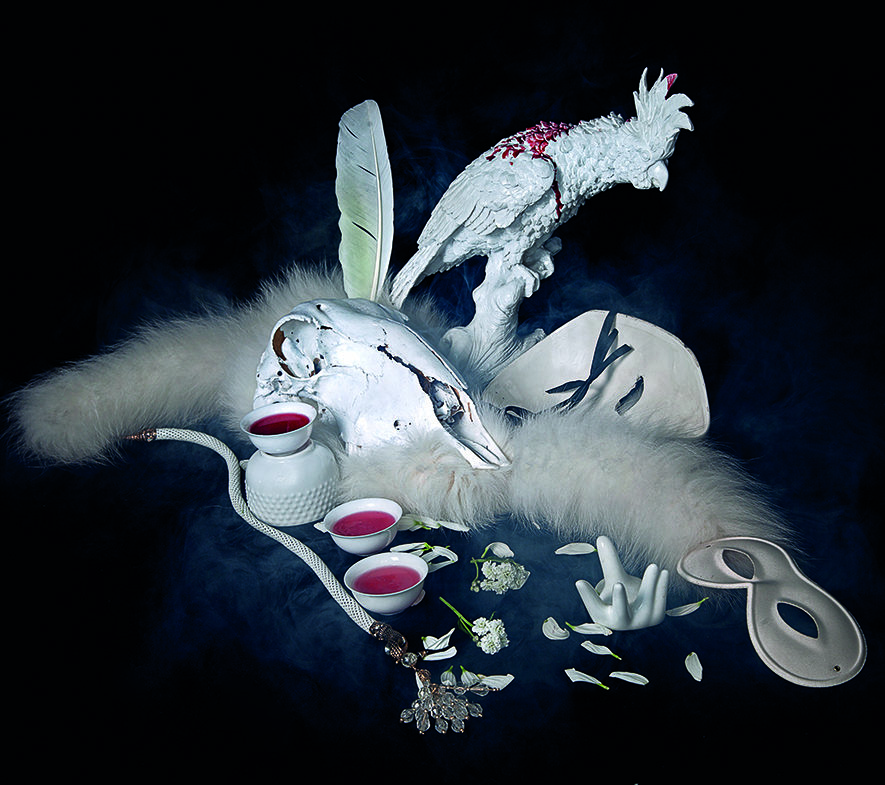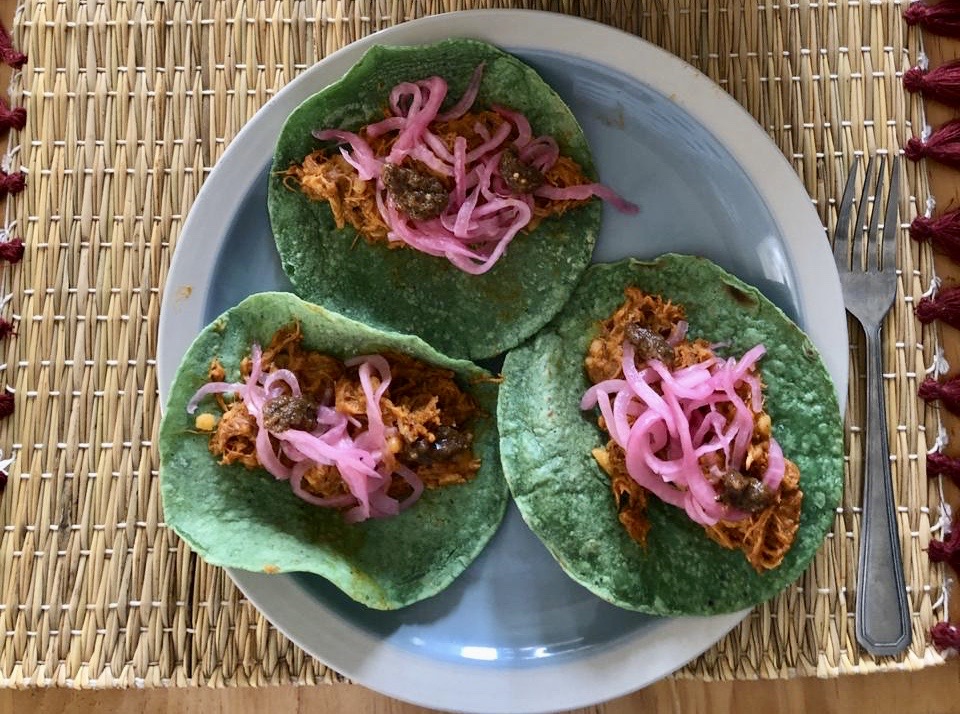Cochinita Pibil
Lo que ven en la foto es un platillo mexicano llamado cochinita pibil. La cochinita pibil es una receta muy típica de la gastronomía yucateca (México). Se basa en cerdo macerado en achiote y asado durante bastante tiempo. La cochinita pibil se suele servir en una tortilla de trigo o de maíz con cebolla morada, chile habanero y naranja.
La que yo tengo en mi plato está servida en tortilla de nopal, por eso el color verde.
Hoy, en todo el mundo vivimos el toque de queda, aislamiento voluntario o bien obligado, como en algunos países, debido al Covid-19.
En México el aislamiento aún es voluntario. Los que podemos nos quedamos en nuestras casas y nos llenamos de pánico con tanta sobre información que circula en las redes sociales.
Mientras tanto, existe otra gran cantidad de personas que les es imposible quedarse en casa, ya que viven al día. Trabajan para comer al día y guardar un poco del sueldo mínimo para el arriendo. Miles de personas no pueden darse el lujo de esta cuarentena en aislamiento por que si lo hacen simplemente no comen.
En Latinoamérica, particularmente, siete de cada diez personas se dedican a un empleo informal, que ante el estado de emergencia que hoy se vive, no cuentan con ningún apoyo económico, ni seguridad social. Esto nuevamente pone en evidencia el estado de vulnerabilidad económica en la que muchos países de Latinoamérica viven y la poca previsión con la que cuentan los estados ante situaciones de emergencias como la que hoy enfrentamos.
Esta crisis sanitaria mundial ha puesto en evidencia que existen al menos dos tipos de estratos sociales: los que pueden quedarse en casa y los que no.
En Yucatán – de dónde es originaria la cochinita pibil – miles de personas quedaron desempleadas al cerrar hoteles y centros turísticos.
De este lado del mundo se vive una zozobra en todos los sentidos, pero sobre todo económica.
Este platillo de cochinita pibil que hoy puedo disfrutar en mi casa, llegó aquí ya que una amiga comenzó la venta a domicilio de comida casera para poder sobrellevar esta situación de incertidumbre que todos vivimos. Cada fin de semana, mi amiga Angie elabora platillos típicos de la cocina mexicana y lo anuncia en su muro de facebook, los interesados le escriben, le hacen una transferencia bancaria y ella lo manda a domicilio.
Estos tiempos exigen que repensemos nuestras estructuras económicas y redes solidarias.
Cochinita Pibil
Das Foto zeigt das mexikanische Gericht „Cochinita Pibli“. Es ist typisch für die Küche der Region Yucatán. Grundlage ist Schweinefleisch, das in Annatto mariniert und lange geschmort wird. Serviert wird Cochinita Pibil meist in einer Tortilla aus Mais- oder Weizenmehl, garniert und gewürzt mit roter Zwiebel, etwas Saft einer Orange und scharfem Habanero Chili.
Bei der Variante auf meinem Teller ist das Fleisch auf Tortillas aus Maismehl und Feigenkaktus gebettet, daher ihre grüne Farbe.
Heute leben wir auf der ganzen Welt mit Ausganssperre, freiwilliger oder in einigen Ländern auch verordneter Isolation aufgrund von Covid-19.
In Mexiko ist die Isolation noch freiwillig. Alle, die wir es uns erlauben können, bleiben zuhause und werden durch die Flut an Informationen, die in den sozialen Netzwerken zirkulieren, von Panik erfasst.
Gleichzeitig ist es anderen Menschen, und das sind die meisten, nicht möglich, zuhause zu bleiben, nämlich denen, die ohnehin von der Hand in den Mund leben. Sie arbeiten für das tägliche Brot und um von dem Mindestlohn noch ein wenig für die Monatsmiete zur Seite legen zu können. Tausende von Menschen können sich den Luxus einer Quarantäne schlicht nicht leisten, weil sie sonst nichts zu essen hätten.
Gerade in Lateinamerika gehen sieben von zehn Personen einer informellen Tätigkeit nach, weshalb sie angesichts des aktuellen Ausnahmezustands mit keinerlei wirtschaftlicher Unterstützung oder sozialer Absicherung rechnen können. Das führt einmal mehr die wirtschaftliche Vulnerabilität, die in den meisten Ländern Lateinamerikas Realität ist, vor Augen und die mangelnde Vorsorge, die diese Staaten angesichts solcher Ausnahmesituationen, wie wir sie derzeit erleben, nur leisten können.
Diese weltweite sanitäre Krise hat deutlich gemacht, dass es mindestens zwei soziale Schichten gibt: die, die zuhause bleiben können und die, denen das nicht möglich ist.
In Yucatán, der Region, aus der das Gericht Cochinita Pibli stammt, sind durch die Schließung von Hotels und sonstigen Einrichtungen der touristischen Zentren Tausende von Menschen arbeitslos geworden.
Auf dieser Seite der Welt bekommen wir die Widrigkeiten in jeder Hinsicht zu spüren, am stärksten jedoch wirtschaftlich.
Dieses Cochinita Pibil, das ich mir heute zuhause schmecken lassen kann, verdanke ich einer Freundin, die begonnen hat, hausgemachte Speisen auszuliefern, um diese ungewissen Zeiten, die uns alle betreffen, zu überbrücken. Jedes Wochenende bereitet meine Freundin Angie typische Gerichte der mexikanischen Küche zu und kündigt sie über facebook an; wer Interesse hat, schreibt ihr, überweist ihr die Bezahlung, und wird zuhause beliefert.
Solche Zeiten fordern uns auf, unsere Wirtschaftsstrukturen und solidarischen Netzwerke neu zu überdenken.
Übersetzung: Lea Hübner
Cochinita Pibil
What you see in this picture is “cochinita pibil,” a Mexican dish. Cochinita pibil is a very traditional recipe from the Yucatan region in Mexico. First we marinate pork in achiote, then we slow roast it. Cochinita pibil is usually served over flour or corn tortillas with red onion, habanero pepper, and orange zest and juice. The plate I have in front of me is served over tortillas made with Nopal cactus, so that is why it’s green.
These days, the entire world is under quarantine―whether voluntary or mandatory―due to the Covid-19 outbreak. In Mexico, we are (so far) in voluntary isolation. Those of us who can afford to do it are staying at home, panicking due to the information overload in social media.
However, there is a large number of people who cannot stay at home, since they live day to day. They work to put food on the table and the little money they are able to save goes for rent, since they make minimum wage. Thousands of people cannot afford to be quarantined; otherwise they will have nothing to eat.
In Latin America, especially, seven out of ten people have informal jobs. During a state of emer-gency as the one we’re living through right now, they don’t get any financial support or social se-curity. This further emphasizes the state of financial vulnerability many Latin American countries experience, and the little welfare measures countries have in place to address emergencies such as the one caused by an epidemic.
This international health crisis has highlighted the fact that there are at least two large social groups: Those who can stay at home, and those who cannot.
In Yucatan, where cochinita pibil comes from, thousands of people lost their jobs when hotels and tourist attractions were closed down.
On this side of the world, we are experiencing a breakdown in all possible senses of the world. Above all, this is an economic breakdown.
This plate of cochinita pibil that I am able to enjoy at home has reached my kitchen thanks to a friend who started to delivery homemade food so that she can survive these uncertain times. Every weekend, my friend Angie has been cooking typical Mexican dishes and posting them to her Facebook wall, so clients can make payment online, and she can deliver the food to their homes.
The time has come for us to rethink our financial structure and solidarity networks.
Translation: Rafa Lombardino
Share
-
29 Samstag
19:30 UhrOut of Sight. Filmische Lesungen
Mit Texten von Yıldız Çakar, Laura Uribe, Dalia Taha und Monageng Vice Motshabi und Visuals von Ayşe Gülsüm Özel

-
29 Montag
19:30 UhrOut of Sight.
WerkstattgesprächWerkstattgespräch mit Yildiz Çakar, Monageng Motshabi, Laura Uribe und Dalia Taha
Moderation: Maxi Obexer und Mazlum Nergiz

Veranstaltungen mit Laura Uribe
2020
August
2019
April












